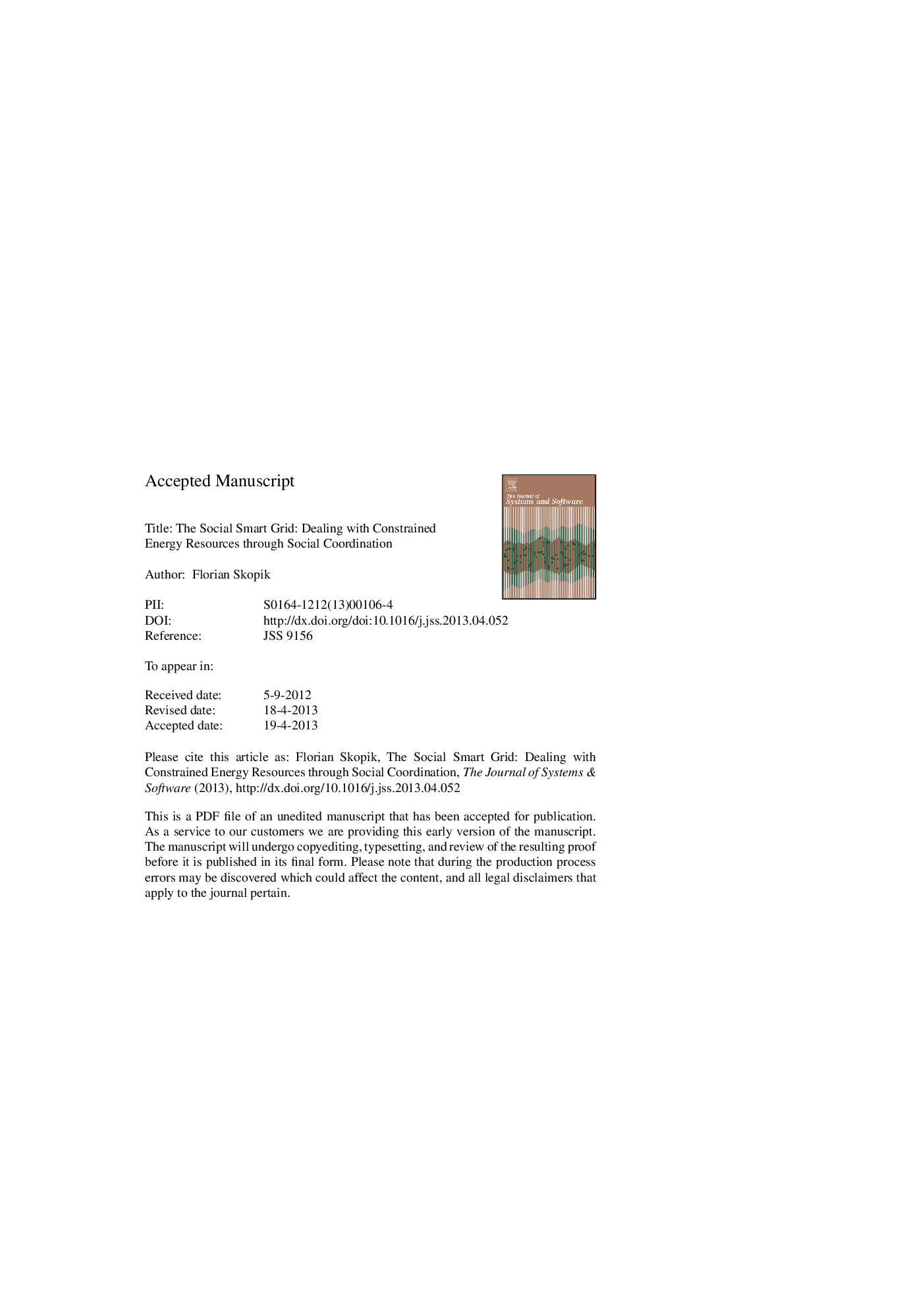| کد مقاله | کد نشریه | سال انتشار | مقاله انگلیسی | نسخه تمام متن |
|---|---|---|---|---|
| 6885732 | 696279 | 2014 | 19 صفحه PDF | دانلود رایگان |
عنوان انگلیسی مقاله ISI
The social smart grid: Dealing with constrained energy resources through social coordination
ترجمه فارسی عنوان
شبکه هوشمند اجتماعی: مقابله با منابع انرژی محدود شده از طریق هماهنگی اجتماعی
دانلود مقاله + سفارش ترجمه
دانلود مقاله ISI انگلیسی
رایگان برای ایرانیان
کلمات کلیدی
شبکه هوشمند اجتماعی، تعادل مصرف انرژی، به اشتراک گذاری انرژی بر مبنای جامعه،
ترجمه چکیده
شبکه هوشمند وعده داده است که بهره وری و قابلیت اطمینان عرضه انرژی فردا را بهبود بخشد. یکی از بزرگترین دستاوردهای شبکه های هوشمند آینده، حالت توزیع شده آنهاست که به طور موثری گره های آسیب پذیر را ایجاد می کند که باعث نقاط ضعف در شبکه می شود. با این حال، به دلیل عدم تولید و کنترل متمرکز بر انرژی، هماهنگی مصرف انرژی اولویت اولویت است. از آنجا که فن آوری های موجود برای ذخیره انرژی در مقیاس بزرگ هنوز وجود ندارد، تمام انرژی مورد نیاز باید در همان زمان تولید شود. بنابراین بزرگترین چالش تولید کنندگان انرژی به طور قابل اعتماد پیش بینی و ارائه مقدار مناسب انرژی لازم برای جلوگیری از کمبود و خرابی است. در این مقاله، ما راه جدیدی را پیشنهاد می دهیم تا ذینفعان شبکه های هوشمند، یعنی تولید کنندگان و مصرف کنندگان انرژی، خود را با هم مقایسه می کنند. برای این منظور، مدل های شبکه اجتماعی سنتی و مفاهیم محاسبات سرویس گرا را با شبکه هوشمند ترکیب می کنیم تا مشتریان بتوانند جوامع را با توجه به رفتار مصرف انرژی خود تشکیل دهند. این جوامع آنها را قادر می سازد تا با سایر ذینفعان شبکه ارتباط برقرار کنند تا برنامه های مصرف انرژی را هماهنگ کنند و اتحادهای اشتراک خصوصی انرژی را ایجاد کنند. به این ترتیب، ارائه دهنده خدمات و تولید کنندگان انرژی صنعتی می توانند به تقاضای انرژی قابل پیش بینی تر و نرم تر از مشتریان متکی باشند. ما یک چارچوب نرم افزاری را معرفی می کنیم، با استفاده از استانداردهای به طور گسترده ای پذیرفته شده، قابلیت های آن را با یک شبیه سازی مبتنی بر عامل نشان می دهد، و در مورد کاربرد کلی آن بحث می کنیم.
موضوعات مرتبط
مهندسی و علوم پایه
مهندسی کامپیوتر
شبکه های کامپیوتری و ارتباطات
چکیده انگلیسی
The smart grid promises to improve the efficiency and reliability of tomorrow's energy supply. One of the biggest achievements of future smart grids will be their distributed mode of operation which effectively eliminates vulnerable nodes causing single points of failures in the grid. However, due to the lack of centralized energy production and control, the coordination of energy consumption becomes first priority. Because there do not exist technologies to store energy at large-scale yet, all energy that is required must be produced at the same time. The biggest challenge of energy producers is therefore to reliably predict and provide the right amount of required energy to avoid shortages and breakdowns. In this paper, we propose a novel way to let smart grid stakeholders, i.e., energy producers and consumers, coordinate their energy demands themselves. For that purpose we combine traditional social network models and service-oriented computing concepts with the smart grid to allow consumers to form communities according to their energy consumption behavior. These communities enable them to interact with other grid stakeholders to coordinate energy consumption plans and set up private energy sharing alliances. This way, the utility provider and industrial energy producers can rely on a better predictable and a smoother energy demand of customers. We introduce a software framework, making use of widely adopted standards, demonstrate its feasibility with an agent-based simulation, and discuss its overall applicability.
ناشر
Database: Elsevier - ScienceDirect (ساینس دایرکت)
Journal: Journal of Systems and Software - Volume 89, March 2014, Pages 3-18
Journal: Journal of Systems and Software - Volume 89, March 2014, Pages 3-18
نویسندگان
Florian Skopik,
